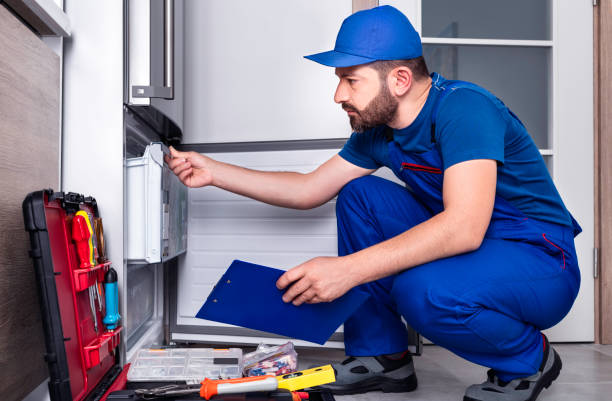
Electrical outlets are used every day in homes throughout Plum, but when they start to overheat, they quickly become a hazard. What seems like a minor issue at first—a slightly warm faceplate or a faint odor—can grow into a safety risk if it’s ignored. For homeowners, knowing how and why outlets overheat is the first step in heading off potential damage to appliances and wiring or worse, fire hazards.
Even in newer homes, outlet overheating can still develop over time from overloaded circuits, poor connections, or wear and tear. And during the summer months when fans, air conditioners, and kitchen appliances are all working harder, the likelihood of overheating problems tends to increase. Instead of waiting until something goes wrong, it’s best to understand the causes and act early.
Understanding Electrical Outlet Overheating
Outlets in residential homes typically heat up when they’re forced to handle more current than they’re designed for. This often happens when too many devices are plugged into one outlet or circuit, especially if high-powered appliances like air conditioners or space heaters are involved. A worn or damaged outlet can also lead to overheating, even if it’s not overloaded.
A few typical causes of outlet overheating include:
- Loose wiring or poor electrical connections inside the outlet
- Outlets that are overloaded with too many devices or power strips
- Old or low-quality outlets that break down over time
- Appliances drawing more power than the outlet or circuit can safely handle
Spotting the signs early can help prevent long-term electrical damage. Homeowners in Plum should keep an eye out for these warning signs:
- A faceplate that feels warm or hot to the touch
- Discoloration or scorch marks around the outlet
- A burning smell near the outlet
- Plugs that fall out loosely or don’t stay secured
- Occasional humming or buzzing sounds from the outlet
Ignoring these signs can have serious consequences. Overheating outlets can grow into fire hazards or lead to damaged connected equipment. If one outlet has problems, it might also point to larger wiring issues behind the scenes. At the very least, any persistent warmth should be treated as an early warning to get the outlet evaluated by qualified electricians in Plum.
Preventive Measures For Electrical Outlet Overheating
The most effective way to deal with outlet overheating is to prevent it altogether. Regular inspections by licensed electricians in Plum can help identify loose connections or stressed circuits before they escalate. Professional evaluations give homeowners a clearer understanding of how well their outlets, wiring, and devices are holding up under day-to-day use.
Spacing out electrical outlets during installation is also an effective preventive step. It ensures appliances aren’t drawing heavy loads from the same circuit. Homes with a lot of electronics or multiple major appliances should be set up with enough dedicated circuits to manage the load safely.
Another overlooked step is the type of outlet used. Lower-cost or outdated outlets may lose grip over time or not perform well under higher energy demand. Replacing these with quality, newer models rated for higher amperage can help avoid overheating issues down the road.
Homeowners should also:
- Avoid daisy-chaining power strips or plugging one surge protector into another
- Unplug devices that aren’t in use to lower the load
- Use electrical devices that are well-maintained and in good condition
Simple adjustments to load distribution and outlet quality can go a long way in reducing overheating risks. These proactive measures don’t just protect outlets—they protect the entire home’s electrical system and the people living in it.
Best Practices For Homeowners To Avoid Overheating
Taking a few simple steps at home can go a long way in lowering the risk of electrical outlet overheating. The way appliances are used, where they’re plugged in, and the condition of connected devices can all make a difference. In most cases, the problems begin when homeowners unknowingly overload an outlet, or repeatedly plug appliances into circuits already operating near capacity.
Here are some safe usage habits that can reduce stress on outlets in a typical Plum household:
- Stick to one high-draw appliance per outlet. Avoid plugging in two energy-hungry devices like an air fryer and a microwave into the same outlet or power strip
- Use surge protectors or smart power strips when powering several devices in one area. These tools can shut off power during spikes or overloads
- Avoid plugging extension cords into power strips. This adds unnecessary load and increases the chance of overheating
- Check your appliance cords regularly for damage. Replace any with fraying, corrosion, or loose prongs
- Turn off and unplug devices that aren’t being used. This reduces unneeded draw and gives outlets a break
For example, a homeowner in Plum noticed the wall around her outlet was warm each afternoon. She had been running a toaster oven and electric kettle off the same power strip for months. Once reconfigured to separate outlets on different circuits, the overheating stopped completely. Small changes like this can keep outlets cooler and reduce fire risk.
Paying attention to how outlets are used helps extend their lifespan. Proper use also makes it less likely that homeowners will need emergency repairs or find themselves replacing electronics damaged from ongoing heat issues.
Importance Of Regular Electrical Maintenance
Even cautious homeowners who follow best practices can face electrical problems over time. Regular maintenance helps uncover hidden wear and tear on outlets, wiring, or circuit breakers. These issues may be missed during everyday use but could eventually lead to dangerous overheating.
Hiring licensed electricians in Plum for scheduled inspections helps catch aging outlets, loose connections, and signs of electrical overload before they start affecting other parts of the home. These visits are also a chance to ask whether the current setup matches today’s needs. As families add larger TVs, gaming systems, or charge multiple devices in one room, past electrical setups may no longer be enough.
Routine maintenance doesn’t just help avoid damage. It also cuts down the overall cost of electrical repair. Addressing a faulty outlet early is far more affordable and faster than dealing with damage caused by an electrical fire or blown circuit.
Some benefits of regular inspections include:
- Detecting weakening contacts in outlets that seem fine on the surface
- Updating older outlets to GFCI or AFCI types for better safety
- Identifying aging circuit breakers no longer handling current properly
- Preventing outlet overheating during peak summer usage
Homeowners in Plum should work with trained professionals who know local safety codes and wiring layouts. Our professionals have the experience needed to inspect connections thoroughly and recommend any changes based on real conditions inside the home.
When To Call A Professional Electrician
Sometimes it’s easy to know when you need to bring in an electrician. Other times, the signs are subtle but still serious. A single outlet that feels hot or smells like melting plastic should always be taken seriously. These early clues are often the first step toward more severe problems.
Contact trained electricians in Plum if you notice:
- A burning smell anywhere near an outlet or switch
- Outlet covers that are discolored, cracked, or warped
- Outlets that spark when plugging something in
- Frequent tripping of breakers when using regular appliances
- Light flickering or dimming when using a known working device
If you’re unsure about what’s causing the problem, it’s best to have it inspected. Our professionals will check for heat damage, worn wiring, and unsafe outlet loads. You can expect a careful review of the entire area, not just a quick look. If upgrades or rewiring are needed, our technicians break the work into clear steps so you know what’s going on in your home.
Bringing in help early can prevent expensive damage and give you peace of mind. Electrical systems aren’t something to gamble with. Even if the problem seems small at first, the risk to your property and safety is too high to ignore.
Safeguard Your Plum Home From Electrical Hazards
Avoiding overheating in electrical outlets starts with awareness. Knowing how to use your appliances safely, recognizing the warning signs, and taking basic steps to lower risk will protect your household from long-term damage. Combine good habits with regular check-ins from licensed electricians, and you’ll have a system that stays safer and runs longer.
Plum residents rely on their outlets year-round, especially during high-use summer months. Don’t wait until you smell burning plastic or see a flickering light. Whether your home is older or recently built, regular inspections can make a big difference.
Your safety depends on how well your electrical system is managed. A few simple habits and regular support from trained professionals can help your outlets and your home stay safe.
When protecting your home from electrical hazards, it helps to act before minor issues become major problems. Supreme Heating and Cooling is here to support you with expert maintenance in Plum. Partnering with experienced electricians in Plum can help you address early warning signs and keep your system running smoothly. For a quick estimate or to book a service visit, please contact us today.

.svg)

.webp)


.svg)
.webp)
.svg)
